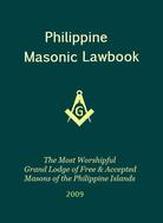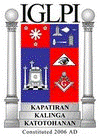
The Independent Grand Lodge of Free and Accepted Masons of the Philippine Islands was formed and constituted in 2006 with seven regular lodges from the Grand Lodge of the Philippines. Three of its lodges are century-old lodges; two of them, Pilar Lodge (1894) and Bagong Buhay (1907) trace their roots from the original lodges of the Spanish Grande Oriente Espanol in the Philippines, while one lodge, Cavite No 2, (1903) traces its lineage from one of the three American lodges that formed the Grand Lodge of the Philippines in 1912. In the first grand assembly held in November of 2006, the seven lodges ratified the IGLPI constitution, its implementing codes and the Uniform code of by-laws for member lodges. These comprise a masonic law book which was published for use of its member lodges in 2009.
|
IGLPI ConstitutionThe Constitution defines the primary function of the Grand Lodge to preserve, protect, promote and propagate the tenets and ideals of Freemasonry and to enhance the welfare of the Fraternity and the Lodges in its jurisdiction. It provides the general framework for governance, Masonic justice and legislation and mandates the creation of executive, legislative and judicial councils. Under the Constitution, the executive power of the Grand Lodge is vested in the Grand Master who presides over an Executive Council composed of all elected Grand Officers. The legislative power is vested in the Grand Assembly. In-between grand assemblies, it is exercised by the Legislative Council presided by the Deputy Grand Master. The Judicial power is vested in the Judicial Council presided by the Senior Grand Warden. All Grand Assemblies and official Grand Lodge functions are administered by the Junior Grand Warden. The Constitution also provides for the creation of a Council of Elders as an advisory and oversight body. It also provides for the formulation of governing codes such as the Administrative Code, Judicial Code, Election and Appointments Code, and the Uniform Code of By-laws for Member Lodges. The importance of continuing Masonic Education is underscored by the constitutional mandate to establish an autonomous Center for Masonic Studies. Administrative Code It codifies the basic principles and rules of governance of the Grand Lodge and its member lodges which are disseminated throughout our Ancient Landmarks, the Constitutions of Masonry and in other Masonic jurisdictions, the Rules and Regulations of the Craft, books, manuals, jurisprudence, ancient usages and traditions. It affirms that the true power of Freemasonry belongs to the lodges and the Grand Lodge merely exercises administrative function over them; that the power of governance comes from the member lodges and the authority of the Grand Lodge emanates from them. It defines the distribution of power in the Grand Lodge and the accountability of all officers. It details the process and criteria for forming new lodges and the organization of Masonic districts and regions based on the principle of lodge and district initiatives. It also provides the mechanism by which a lodge may be incorporated and maintain ownership of their properties. Another aspect defined by the code is the tenure of office of appointees to the various councils and institutional bodies to ensure continuity of functions and programs of the Grand Lodge. Election and Appointments Code This code governs the election and appointment of Grand Officers in consonance with the injunction or rather emulation of who best can work and best agree to ensure the highest standards of integrity, harmony and efficiency of all lodges affiliated with and chartered in the IGLPI jurisdiction. It defines the eligibility and qualifications of elective and appointive officers; sets primary criteria for evaluation and the process by which nominees for the office of the Junior Grand Warden are selected. It defines the functions of the Election Board and sets the tenure of office of its members. An important feature of the Election Code deals with the creation of a Panel of Peers during the grand election, which shall be tasked to rank the probable candidates for Junior Grand Warden submitted by the Election Board, for final evaluation and official nomination by the Council of Elders. The code also sets election rules and regulations, defines the scope of electioneering and prescribes sanctions against all election related offenses. An Electoral Tribunal is also established to resolve election related complaints and charges with recommendatory powers for further investigation and action by the Judicial Council for probable Masonic offenses. Uniform Code of By-laws for Member Lodges A uniform code for administration of lodges prescribes standard by-laws for all member lodges of the Grand Lodge. It codifies the laws, rules and regulations for lodge governance including the powers, authority, functions and duties of all member lodges and their officers. It enshrines the rights and privileges of individual masons and defines their duties and obligations. Judicial Code The Judicial Code defines the legal and moral bases of the judicial power of the Grand Lodge, beginning with the definition of justice as that standard or boundary of right which enables us to render unto every man his just due, without distinction. It cites essential Landmarks that serve as the foundation of Masonic justice and the constitutional provisions that enshrine the inherent rights of masons. It details the organization, powers, authority and functions of the Judicial Council, and prescribes the processes and mechanisms necessary toward the preservation, protection and dispensation of Masonic justice. >>>Grand Lodge organization |
